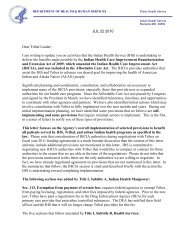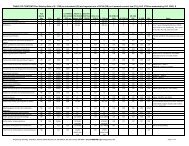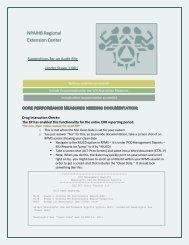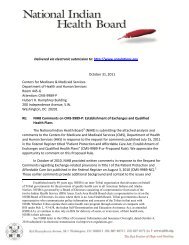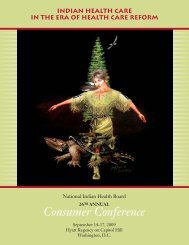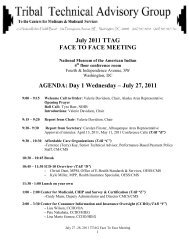âHealth Insurance Premium Tax Creditâ (IRS REG-131491-10)
âHealth Insurance Premium Tax Creditâ (IRS REG-131491-10)
âHealth Insurance Premium Tax Creditâ (IRS REG-131491-10)
- No tags were found...
You also want an ePaper? Increase the reach of your titles
YUMPU automatically turns print PDFs into web optimized ePapers that Google loves.
NIHB Analysis of Proposed Rule: Health <strong>Insurance</strong><strong>Premium</strong> <strong>Tax</strong> Credit (<strong>IRS</strong> <strong>REG</strong>-<strong>131491</strong>-<strong>10</strong>)the definition of health insurance coverage used by the CensusBureau has not included programs operated by the IHS.A footnote to the “CPS Health <strong>Insurance</strong> Definitions” reads:“After consulting with health insurance experts, the Census Bureaumodified the definition of the population without health insurance inthe Supplement to the March 1998 Current Population Survey, whichcollected data about coverage in 1997. Previously, people with nocoverage other than access to the Indian Health Service were countedas part of the insured population. Subsequently, the Census Bureauhas counted these people as uninsured. The effect of this change onthe overall estimates of health insurance coverage was negligible.” 26Due to the limitations on annual appropriations, the IHS doesnot provide guaranteed access to a defined set of covered services forthe eligible population. As indicated above, the IHS is funded for onlya fraction of the level required to provide guaranteed access to astandard set of covered services. As is the case with other health careprograms operated by governments at the Federal, State or locallevel, health care programs that do not provide guaranteed access toa defined and comprehensive set of services—such as is the case withthe IHS programs—should not be included in the definition of“creditable coverage” for purposes of implementing the PCIP.Similarly, the Congressional Budget Office does not consider individuals served onlyby the Indian Health Service to be "insured":Because of staff shortages, limited facilities, and a capped budget, theIHS rarely provides benefits comparable with complete insurancecoverage for the eligible population; as a result, estimates of theuninsured population in the United States do not treat the IHS as asource of insurance. 27In fact, because of the funding shortfall, IHS estimated the extent of health servicedenials at $130 million in 2008. 28 As a comparison, per capita spending for IHS medical carein 2003 was only slightly more than 50% of the per capita amount spent for Federalprisoners. 292627http://www.census.gov/hhes/www/hlthins/methodology/definitions/cps.htmlCongressional Budget Office, "Key Issues in Analyzing Major Health <strong>Insurance</strong> Proposals," at 127(Dec. 2008).2829Indian Health Service, Fiscal Year 2011 Budget Justification, at CJ-95.U.S. Commission on Civil Rights, Broken Promises: Evaluating the Native American Health CareSystem, at 98 (Sept. 2004).National Indian Health Board Page <strong>10</strong> of 23 October 31, 2011



